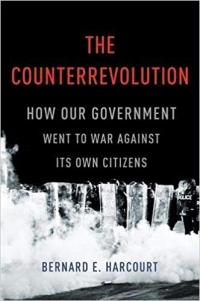On the American Counterrevolution: The Long View of History in Politics and Law

2018-19 CUSP Distinguished Speaker Series - Inaugural Lecture
Wednesday, September 19, 2018
6:00–8:00 p.m.
3rd Floor Lecture Room, Pulitzer Hall
Recent political events feel like spontaneous revolutions. With 24-hour news cycles, daily revelations, and viral Tweets, politics resembles today reality-TV and marches on the temporality of social media. But it brings with it new and radical ways of governing that have deep roots. Lurking beneath today’s rapid-fire politics and law, there is a longer, slower course of history, one that plants the seeds for what will come later, after the momentary crises. This keynote lecture will focus both on the emergence of the American Counterrevolution and the long-defense of a death row inmate to explore lateness in politics and law.
Biography
Bernard E. Harcourt is the Isidor and Seville Sulzbacher Professor of Law and Professor of Political Science at Columbia University. He is the Executive Director of the Eric H. Holder Initiative for Civil and Political Rights, and the founding director of the Columbia Center for Contemporary Critical Thought at Columbia University. He is also a Directeur d’études (chaired professor) at the École des Hautes Études en Sciences Sociales in Paris.
A contemporary critical theorist and social justice advocate, Harcourt is the author most recently of The Counterrevolution: How Our Government Went to War Against Its Own Citizens (Basic Books, 2018). Harcourt’s writings examine modes of governing in our punitive and surveillance society, especially in the post 9/11 period and the digital age. He traces the birth of what he calls our “expository society” and our recent turn to the paradigm of “counterinsurgency warfare” as a mode of governing. He is the author, recently as well, of Exposed: Desire and Disobedience in the Digital Age (Harvard 2015), The Illusion of Free Markets: Punishment and the Myth of Natural Order (Harvard 2011), and Occupy: Three Inquiries in Disobedience with Michael Taussig and W.J.T. Mitchell (Chicago 2013). Earlier books include Against Prediction: Profiling, Policing and Punishing in an Actuarial Age (Chicago 2007), Language of the Gun: Youth, Crime, and Public Policy (Chicago 2005), and Illusion of Order: The False Promise Of Broken Windows Policing (Harvard 2001).
Harcourt is also an editor of the works of Michel Foucault. He recently edited the French edition of Michel Foucault’s 1972-73 lectures at the Collège de France, La Société punitive (Gallimard 2013) and the 1971-1972 lectures, Theories et institutions pénales (Gallimard 2015). He is also the editor of the new Pléiade edition of Surveiller et punir in the collected works of Foucault at Gallimard (2016). He is co-editor of the lectures Foucault delivered at Louvain in 1981, in French and English, Wrong-Doing, Truth-Telling: The Function of Avowal in Justice (Chicago 2014). He is currently working on Foucault’s lectures on Nietzsche for the next series of lecture publications by Gallimard/Le Seuil.
A passionate advocate for justice, Harcourt started his legal career representing death row inmates, working with Bryan Stevenson at what is now the Equal Justice Initiative in Montgomery, Alabama. He lived and worked in Montgomery for several years and still today continues to represent pro bono inmates sentenced to death and life imprisonment without parole. He recently resolved the case of death row inmate Doyle Hamm who was executed but survived the ordeal. He also served on human rights missions to South Africa and Guatemala, and actively challenged the Trump administration’s Muslim Ban, representing pro bono a Syrian medical resident excluded under the executive order, as well as Moseb Zeiton, a Columbia SIPA student.